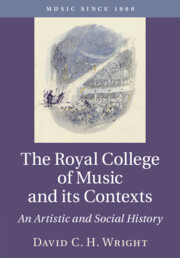Book contents
- The Royal College of Music and Its Contexts
- Music Since 1900
- The Royal College of Music and Its Contexts
- Copyright page
- Dedication
- Contents
- Figures
- Tables
- Acknowledgements
- Notes on the Text
- Abbreviations
- Introduction
- Part I Building and Consolidating (1883–1914)
- 1 The Founding Directors
- 2 The Students
- 3 Establishing the Musical and Educational Ethos
- 4 The Buildings and Finances
- Coda
- Part II Renewal and Conventionality (1919–1960)
- Part III Changing Musical Cultures (1960–1984)
- Part IV Into Its Second Century, 1984–2018
- Epilogue
- Works Cited
- Index
3 - Establishing the Musical and Educational Ethos
Concerts and Curriculum
from Part I - Building and Consolidating (1883–1914)
Published online by Cambridge University Press: 26 August 2019
- The Royal College of Music and Its Contexts
- Music Since 1900
- The Royal College of Music and Its Contexts
- Copyright page
- Dedication
- Contents
- Figures
- Tables
- Acknowledgements
- Notes on the Text
- Abbreviations
- Introduction
- Part I Building and Consolidating (1883–1914)
- 1 The Founding Directors
- 2 The Students
- 3 Establishing the Musical and Educational Ethos
- 4 The Buildings and Finances
- Coda
- Part II Renewal and Conventionality (1919–1960)
- Part III Changing Musical Cultures (1960–1984)
- Part IV Into Its Second Century, 1984–2018
- Epilogue
- Works Cited
- Index
Summary
This chapter looks at the musical life at this phase of the RCM, and at its curriculum. It shows that Stanford’s programming of concerts and operas was as adventurous (and sometimes radical) as his approach to teaching composition was confined. The range of repertoire performed at College concerts is discussed, and shows that College students were exposed to a much wider range of musical influence than has been commonly thought. In 1903 the College received a significant capital endowment (called the Patron’s Fund) to help it mount concerts to advance young British composers and performers, and the implications of this Fund for the College and its reputation are discussed. George Grove’s RCM curriculum (and his emphasis on practical training) is discussed in relation to the evidence Grove gave to the Gresham Committee, advising on the reconstitution of London University. Grove's ideas about the sort of education a music college should offer is further indicated in the professional practice represented by the ARCM diploma, and the chapter ends with an analysis of ARCM passes which shows its significance as a qualification.
Keywords
- Type
- Chapter
- Information
- The Royal College of Music and its ContextsAn Artistic and Social History, pp. 81 - 106Publisher: Cambridge University PressPrint publication year: 2019

